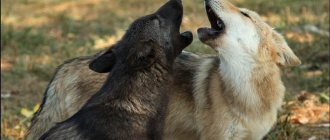Howl like a wolf in a dream
Dream Interpretation In a dream, you dreamed of howling like a wolf , why do you dream about howling like a wolf in a dream?
To select a dream interpretation, enter a keyword from your dream into the search form or click on the initial letter of the image characterizing the dream (if you want to get an online interpretation of dreams by letter for free alphabetically). Now you can find out what it means to see howling like a wolf in a dream by reading below for free interpretations of dreams from the best online dream books of the House of the Sun!
A dream sometimes itself keeps attention on some place, detail, action.
At the same time, time seems to freeze in the process, “scrolls”; The dream thereby emphasizes the special duration of what the designated fixation represents.
For example, “running in a dream” and at the same time additionally “getting stuck”, slowing down, freezing in place indicates the duration of interference and problems, given that “running in a dream” in general means interference and difficulties.
“Eating in your sleep” with fixation on the chewing process has a similar effect: minor troubles, scrolling (chewing) receive additional reinforcement.
Moreover, such a temporal elongation of an event will not necessarily be associated with the length of daytime (real) time, but more often happens in internal, subjective perception.
On the contrary: the speed, instantaneousness of events and various transformations indicates suddenness, unexpectedness, suddenness, transience of phenomena and feelings of a person sleeping in reality.
It may turn out to be the acquisition of long-awaited freedom and independence.
It is also beneficial for the parents themselves (with the rare exception of direct non-symbolic scanning dreams).
True, unfulfilled plans and unrealized missed opportunities can also “die.”
The death of a familiar person in a dream may turn out to be separation from him, his departure, or his success (in reality).
It’s even sadder when a feeling like love dies, but the dreamer can always expect new love, new acquaintances and prospects.
Rejoicing in a dream means confidence in your affairs.
To rejoice furiously is a sign of sadness.
Laughing will not achieve your goal.
Laughing uncontrollably means sadness.
Being curious in a dream means beware of gullibility.
To feel strong excitement - to strive for clear self-awareness.
Crying in a dream means joy and all good things.
Feeling offended means arguing with loved ones.
To worry about repentance - your advisor is right.
If you feel irritated, a good friend will help you.
To feel resentment is to live in peace, but in an unfavorable environment.
Disgust towards people - caution is required.
Aversion to objects - your stomach is not in order.
Feeling envy - a faithful heart cannot forget you.
Pity - you have the right to a calm conscience.
Anger - loyalty, a joyful day ahead.
To rage in anger - a small mistake will have serious consequences for you.
To take revenge in a dream means that you cannot achieve justice for a long time.
Fear in a dream is a danger from joyful hopes. The secret worries that you chase during the day, the danger from what you love. Feelings of guilt, obsessions.
Shame and disgrace in a dream - beware of trusting others, interference from your own incontinence in feelings.
To be slandered - beware of rashly divulging a secret.
Going to court in a dream means you will be ridiculed.
To be lazy in a dream, to be indifferent - to sadness, loss.
To be stingy in a dream, to be greedy - you will experience horror.
To be cruel in a dream means you have to leave your homeland.
If in your dreams you walk, run, fly or fight, then you are active in life.
This does not mean, of course, that if you save the inhabitants of an entire city from some disaster in a dream, you will do the same in reality. But such behavior in a dream indicates that a person can and should be active.
This is his nature. A person who acted actively in a dream will try to change something in reality, using the clues of the dream.
Dreams of this type are never discussed publicly.
Even when talking to me alone, dreamers feel embarrassed.
The “toilet” issue is often physiologically determined.
If the sleeper has such a need, then he looks in a dream for a place where he can relieve himself.
Various obstacles may arise.
The toilet is closed, people are in the way, trying to wake up the dreamer and get themselves in order. There is no need to interpret these dreams.
Urinating in a dream is a symbol of relief of the soul, getting rid of some worries, difficult memories.
A dream in which a woman irrigates a pipe.
The penis symbol is clearly connected to a sexual past that she is trying to forget.
Here, as it were, a view of the past from above is revealed.
The roof of today, a new understanding of life circumstances.
Sometimes a person “urinates” in his sleep the night after a failed exam or performance.
This particularly clearly confirms the meaning of symbolic urination in a dream as a way of relieving emotional stress.
But the meaning of symbolic bowel movements in a dream and the type of excrement in general has a wider range of interpretations.
Shoes symbolize the chosen lifestyle.
But excrement can represent not only unwanted experiences and failures in life, but also be a sign that something from a past life should be used.
In such cases, the type of excrement gives us information.
1. Pay attention to the actions in the dream: your own and other characters. If you act only as an observer, then you lack activity in life.
2. Evaluate your actions. Lying down, sitting, and even more so, running away means that you will have unresolved problems.
Lateness in dreams also reports this.
3. If you get into a fight or are attacked, this is a sign of your intransigent character. Don't forget about compromises.
4. Physiological actions during sleep. Satisfaction of natural needs is a factor that heals your psyche and brings emotional liberation. In some cases, it indicates difficulties or successes in your current activities.
Source
General interpretation.
The werewolf began to be perceived as an evil and terrible creature only after the eradication of paganism in Rus' with all its spirits and deities. In ancient times, the Slavs believed that a werewolf, appearing in a dream, tries to help a person, warning him of impending danger or disappointment.
This is how he protects people from evil. The dream of a werewolf meant that someone whom the dreamer trusts and with whom he has a business relationship is preparing a dirty trick for him or simply revealing a side of himself that will cause complete disappointment. Also, such dreams sometimes predict a disease from which you can protect yourself if you interpret the message correctly.
A dream in which a werewolf is present has nothing to do with the death of a person. It never foretells the death of the sleeping person or his loved ones. The werewolf is not a symbol of inevitable misfortune; it only reports its approach so that a person knows what to be wary of. A dream with a werewolf is a warning given to protect against trouble. Therefore, a correctly interpreted dream helps to avoid them or prepare for them in such a way as to endure them with minimal damage to yourself.
If there are several werewolves in a dream.
There may be more than one werewolf dreaming about. Often several werewolves act in a dream, and this is also a warning. According to Old Russian and Old Slavic beliefs, such a dream meant that the sleeper was surrounded by crafty people hiding their true intentions, pretending to be different from what they really were.
In such a situation, in order to avoid trouble, you should understand your surroundings and understand what those with whom you have to communicate are hiding. It often turns out that there are no malicious intentions against the person who sees the dream, and the dream simply warns that he always needs to be on his guard when communicating with insincere people around him.
Most often, the company of werewolves is dreamed of by trusting, open people who do not suspect insincerity in others and quickly get along with everyone who behaves warmly and friendly towards them. At the same time, their frankness can be used against them, making them more vulnerable.
For simple-minded natures, werewolves are a signal and a reminder that people can be two-faced, so you should not immediately mistake everyone for close friends with whom it is appropriate to be frank, laying out everything about yourself. For such a person, werewolves in a dream are an indication that he has opened himself up too much to a person with a double bottom.
When a werewolf behaves aggressively.
Dreams in which the werewolf behaves aggressively towards the dreamer also have their own interpretation among the Slavs. This behavior of the mythical creature indicates that it energetically strives to warn and protect the sleeper from the actions of cunning and deceivers who encroach on his well-being. If a werewolf bites until he bleeds, this means that the fraud planned against a person threatens to cause a serious collapse in life, which will entail a maximum of all kinds of problems.
It turns out that it is not so difficult to prevent trouble by seeing such a prophetic dream. Knowing, thanks to the dream, about the upcoming intrigues, you should evaluate all new acquaintances who offer any profitable deals or especially profitable work.
You should agree to their proposals only if there is not even the slightest hint of deception or trickery. According to Slavic beliefs, an aggressive werewolf especially persistently strives to warn the dreamer about misfortunes so that he can avoid them.
When the werewolf is white or black.
In Rus', when a werewolf dreams, its color is of great importance for the accurate interpretation of the dream. So, if the creature had white fur, then this indicated to the dreamer that he mistakenly considers as ill-wishers those who actually treat him well, even if they do not always know how to show it. The white werewolf strives through a dream to help a person understand his surroundings and correctly evaluate loved ones and acquaintances.
The black werewolf indicates that the fears experienced in reality for some specific reason are not justified and the dreamer is tormenting himself with them in vain. It is believed that more often such a dream is associated with worries due to fear of betrayal, failure in business, or due to distrust of relatives. Thus, when you dream of a werewolf with black fur, you need to correctly assess your fears and get rid of them.
Howl like a wolf in a dream
Dream Interpretation Howling like a wolf in a dream, why do you dream about Howling like a wolf in a dream? To select a dream interpretation, enter a keyword from your dream into the search form or click on the initial letter of the image characterizing the dream (if you want to get an online interpretation of dreams by letter for free alphabetically).
Now you can find out what it means to see Howling like a wolf in a dream by reading below for free interpretations of dreams from the best online dream books of the House of the Sun!
A dream sometimes itself keeps attention on some place, detail, action.
At the same time, time seems to freeze in the process, “scrolls”; The dream thereby emphasizes the special duration of what the designated fixation represents.
For example, “running in a dream” and at the same time additionally “getting stuck”, slowing down, freezing in place indicates the duration of interference and problems, given that “running in a dream” in general means interference and difficulties.
“Eating in your sleep” with fixation on the chewing process has a similar effect: minor troubles, scrolling (chewing) receive additional reinforcement.
Moreover, such a temporal elongation of an event will not necessarily be associated with the length of daytime (real) time, but more often happens in internal, subjective perception.
On the contrary: the speed, instantaneousness of events and various transformations indicates suddenness, unexpectedness, suddenness, transience of phenomena and feelings of a person sleeping in reality.
It may turn out to be the acquisition of long-awaited freedom and independence.
It is also beneficial for the parents themselves (with the rare exception of direct non-symbolic scanning dreams).
True, unfulfilled plans and unrealized missed opportunities can also “die.”
The death of a familiar person in a dream may turn out to be separation from him, his departure, or his success (in reality).
It’s even sadder when a feeling like love dies, but the dreamer can always expect new love, new acquaintances and prospects.
Rejoicing in a dream means confidence in your affairs.
To rejoice furiously is a sign of sadness.
Laughing will not achieve your goal.
Laughing uncontrollably means sadness.
Being curious in a dream means beware of gullibility.
To feel strong excitement - to strive for clear self-awareness.
Crying in a dream means joy and all good things.
Feeling offended means arguing with loved ones.
To worry about repentance - your advisor is right.
If you feel irritated, a good friend will help you.
To feel resentment is to live in peace, but in an unfavorable environment.
Disgust towards people - caution is required.
Aversion to objects - your stomach is not in order.
Feeling envy - a faithful heart cannot forget you.
Pity - you have the right to a calm conscience.
Anger - loyalty, a joyful day ahead.
To rage in anger - a small mistake will have serious consequences for you.
To take revenge in a dream means that you cannot achieve justice for a long time.
Fear in a dream is a danger from joyful hopes. The secret worries that you chase during the day, the danger from what you love. Feelings of guilt, obsessions.
Shame and disgrace in a dream - beware of trusting others, interference from your own incontinence in feelings.
To be slandered - beware of rashly divulging a secret.
Going to court in a dream means you will be ridiculed.
To be lazy in a dream, to be indifferent - to sadness, loss.
To be stingy in a dream, to be greedy - you will experience horror.
To be cruel in a dream means you have to leave your homeland.
If in your dreams you walk, run, fly or fight, then you are active in life.
This does not mean, of course, that if you save the inhabitants of an entire city from some disaster in a dream, you will do the same in reality. But such behavior in a dream indicates that a person can and should be active.
This is his nature. A person who acted actively in a dream will try to change something in reality, using the clues of the dream.
Dreams of this type are never discussed publicly.
Even when talking to me alone, dreamers feel embarrassed.
The “toilet” issue is often physiologically determined.
If the sleeper has such a need, then he looks in a dream for a place where he can relieve himself.
Various obstacles may arise.
The toilet is closed, people are in the way, trying to wake up the dreamer and get themselves in order. There is no need to interpret these dreams.
Urinating in a dream is a symbol of relief of the soul, getting rid of some worries, difficult memories.
A dream in which a woman irrigates a pipe.
The penis symbol is clearly connected to a sexual past that she is trying to forget.
Here, as it were, a view of the past from above is revealed.
The roof of today, a new understanding of life circumstances.
Sometimes a person “urinates” in his sleep the night after a failed exam or performance.
This particularly clearly confirms the meaning of symbolic urination in a dream as a way of relieving emotional stress.
But the meaning of symbolic bowel movements in a dream and the type of excrement in general has a wider range of interpretations.
Shoes symbolize the chosen lifestyle.
But excrement can represent not only unwanted experiences and failures in life, but also be a sign that something from a past life should be used.
In such cases, the type of excrement gives us information.
1. Pay attention to the actions in the dream: your own and other characters. If you act only as an observer, then you lack activity in life.
2. Evaluate your actions. Lying down, sitting, and even more so, running away means that you will have unresolved problems.
Lateness in dreams also reports this.
3. If you get into a fight or are attacked, this is a sign of your intransigent character. Don't forget about compromises.
4. Physiological actions during sleep. Satisfaction of natural needs is a factor that heals your psyche and brings emotional liberation. In some cases, it indicates difficulties or successes in your current activities.
Source
Why do you dream about howling wolves: the meaning of the dream, the most complete interpretation of dreams according to the dream book
The wolf is considered to be a symbol of cruelty, anger, ferocity and insatiability. In real life, this beast acts independently, while bringing a lot of evil to other animals and people. There are a huge number of different expressions that are dedicated to wolves. It was they who were able to be deposited in our subconscious and become a kind of message for the appearance of the image of a wolf in dreams. In this article, we will get to know in more detail why wolves howl in dreams. However, when interpreting such dreams, you must try to remember all the nuances of your night dreams.
General interpretation of dreams
So, why do you dream about howling wolves? It’s worth noting right away that such a dream does not bode well. Speaking about why wolves howl in dreams, it is necessary to pay attention to the fact that this indicates the beginning of a dark streak in the real life of the sleeper. Ahead of a person awaits a series of worries, troubles and suffering. Most likely, someone will make the sleeping person guilty without guilt. In addition, answering the question of why wolves howl in dreams, we can say that such a dream can be a symbol of anxiety and deep-seated fears. If you heard a howl in your night dreams in a drawling manner, then this is a sign of a great threat. In this case, you should pay special attention to the clues that the Universe gives. Only in such cases will it be possible to avoid possible serious consequences for the sleeper. As you can see, the howling of a wolf in a dream does not bode well for a person. However, the day of the week when such a dream occurred plays a special role in interpretation.
Catatrenia as a separate type of breathing disorder during sleep
Catathrenia (sleep groaning) falls into the category of isolated sleep-related symptoms. Attacks of loud sounds, similar to moans or mooing, occur predominantly during REM sleep (80%) mainly in males aged between five and 36 years, with a peak at 19 years of age. The clinical consequences of this condition include deterioration in the quality of sleep and daytime wakefulness, and the social consequences include limitation of social contacts. At the moment, there are two opposing points of view on the nature of catathrenia. According to the first, catathrenia is a form of parasomnia associated with the REM sleep phase; according to the second, it is one of the breathing disorders during sleep. Catathrenia is treated with non-invasive ventilation such as continuous positive air pressure during sleep (CPAP therapy), surgery and oral applicators.
Rice. 1. Polysomnogram during an attack of catathrenia in the REM sleep phase (1 – deep inhalation, 2 – long exhalation, 3 – sound on the sonogram)
Rice. 2. Polysomnogram during an attack of catathrenia in the slow-wave sleep phase (1 – deep inhalation, 2 – long exhalation, 3 – recording sound with a microphone). During these episodes, no changes in activity are observed on the EEG channels
Katatrenia (from the Greek kata
- during and
threnos
- crying for the deceased), or sleep groans (from the English
nocturnal groaning
- night groans), is a rare phenomenon of a change in breathing pattern during sleep. Catathrenia is included in the current third version of the International Classification of Sleep Disorders (ICDS-3) in the section of breathing disorders during sleep along with obstructive sleep apnea syndrome, central sleep apnea, sleep-associated hypoventilation, and snoring [1].
Clinically, catathrenia is manifested by sound phenomena that are similar to groans or mooing, occur periodically during sleep and, despite the fact that they resemble wailing or plaintive crying, are not associated with any pain or expression of emotions on the face.
For the first time, the symptom of night moaning as a result of increased prolonged exhalation in a young man was described by D. Roeck et al. in 1983 [2]. The term “catatrenia” was proposed by R. Vetrugno et al. in 2001. They observed this condition in four patients aged 15 to 25 years, two of them were concerned that moaning would prevent them from living fully in the family with their future spouses [3].
Catathrenia was first included in the ICRS in 2005. At that time, it was positioned as a sleep disorder belonging to the “other parasomnias” group, since it was considered as an unusual form of behavior (vocal phenomenon) during sleep, and changes in breathing patterns were not taken into account [4].
Polysomnographic studies have shown that in most cases (80%) episodes of catathrenia occur during REM sleep. And in the slow-wave sleep phase they develop more often in the superficial (first-second) stages (about 80% of cases) [5].
Attacks of vocalization during catathrenia usually occur two to six hours after falling asleep and last from 2 to 50 seconds, and situations (up to 80% of cases) of group attacks with a duration of a separate cluster from two minutes to an hour are not uncommon. The breathing pattern during an attack has the following distinctive features (Fig. 1): a deep inhalation is followed by a long and labored exhalation, accompanied by a sound described as a grunt or groan. If the attacks form clusters, then an episode of bradypnea is recorded on the sleep polygram, ending with the end of the episode, while blood saturation with hemoglobin usually does not fall below 90%, that is, it does not reach the degree of clinically significant hypoxemia.
On the electroencephalogram (EEG) during an episode of catathrenia, EEG activation is observed directly at the height of inspiration, which continues throughout the entire attack. This feature is typical for attacks that occur during REM sleep. During the slow-wave sleep phase, no EEG activation occurs (Fig. 2) [6]. In addition, during attacks that develop in the REM sleep phase, complete awakening is possible, and its probability directly depends on the duration of the cluster [7]. Electroencephalographically obvious awakening during such episodes occurs in 40–90% of cases, but the patient usually does not remember these episodes the next morning [8].
Sleep moaning typically occurs in young people between the ages of five and 36, with a peak at 19 years of age. The prevalence of catathrenia in the general population is still unknown. It is estimated that this disorder occurs in 0.5% of patients at sleep centers [9]. It is known that men are affected more often than women in a ratio of 3:1. In addition, a family predisposition to the development of this condition has been established: 14.8% of patients have close relatives with the same attacks [4].
The largest number of observations of catathrenia is given in the work of P. Drakatos et al. (2016), who retrospectively studied data from 9000 polysomnographies performed for sleep disorders [6]. Among them, 38 records with obvious signs of catathrenia and another 19 records with suspicion of this condition were found.
The consequences of catathrenia are predominantly of the nature of social maladjustment. For example, young people who go to serve in the army cannot adapt to the team for a long time due to their peculiarities. And women are susceptible to emotional distress because they have difficulty finding a life partner who is not bothered by this condition.
As for daytime symptoms, catathrenia most often manifests itself as increased levels of daytime sleepiness (46%), unrefreshing sleep (88%), and decreased concentration and memory during the day (76%) [10, 11]. However, it should be noted that the only source from which statistics on such complaints were collected is a study by J. Alonso et al., published in 2022 [11]. Using social networks, the researchers recruited people (n = 191) suspected of suffering from catathrenia and asked them to complete a voluntary survey aimed at identifying not only the common complaints mentioned earlier, but also comorbidities. It turned out that 44% of respondents periodically suffered depressive episodes, that is, the sample was not representative, since it included many patients with mental disorders who actively seek help on social media.
Patients themselves rarely notice the manifestations of catathrenia. This condition is more disturbing to those people who, for certain circumstances, sleep next to them (spouses, roommates, travel companions, etc.). Patients themselves more often begin to notice attacks when they become clusters (they account for 6%), during which they wake up.
In the longest longitudinal study of catathrenia, lasting five years, C. Guilleminault et al. did not record changes in the clinical picture over time [12]. However, according to Z. Hao et al., catathrenia can gradually transform into primary snoring or obstructive sleep apnea syndrome [13]. J. Alonso et al. suggested that the long-term consequences of catathrenia could be central or mixed (if a central component is added to the obstructive one) sleep apnea [11, 13].
Due to the insufficiently convincing social and medical consequences of catathrenia, ICRS-3 is considered an isolated sleep-related symptom under the heading “Breathing disorders during sleep.” In other words, this condition is not considered a disease and the criteria for its diagnosis have not yet been agreed upon. However, researchers agree that polysomnography is the gold standard for confirming the presence of this phenomenon.
The differential diagnosis of catathrenia includes central sleep apnea, obstructive sleep apnea, and snoring. Catathrenia differs from central apnea by vocalization (moans or mooing), and from primary snoring, firstly, by the time of sound occurrence (the sound of snoring occurs on inhalation, catathrenia - on exhalation), and secondly, by the characteristics of sound phenomena, which has been proven in study by J. Iriarte et al., where an oscilloscope was used [9]. According to the Yanagihara classification (classification of laryngeal noise, where type 1 means an insignificant amount of noise, and type 4 means almost complete replacement of the laryngeal sound by noise), catathrenia belongs to the second type, and snoring belongs to the fourth. In obstructive sleep apnea, the sound occurs during the recovery of breathing during inhalation and is often described as a “snore.” It is also necessary to distinguish catathrenia from nocturnal attacks of bronchial asthma: with asthma, wheezing, not similar to mooing, is observed when exhaling.
In one of the first studies performed by J. De Roeck et al. (1983), a hypothesis was put forward about the mechanism of development of the moaning sounds characteristic of catathrenia. During the REM sleep phase, a functional narrowing of the glottis occurs (phase I), resulting in a greater expiratory force, then the upper respiratory tract critically narrows (phase II), which is accompanied by a functional and/or organic disruption of the centers that control breathing during sleep ( phase III) [2]. During exhalation, the glottis remains almost completely closed, which is why these peculiar sounds appear [14]. The predisposition to narrowing of the upper respiratory tract may be congenital: Z. Hao et al. found in people with catathrenia a decrease in the angle of the lower jaw along the Frankfruit horizontal line (a line running from the lower edge of the orbit to the upper edge of the external auditory canal, which determines the range of movements in the lower jaw) [13].
Despite the fact that in the current ICRS-3 catathrenia is included in the category of breathing disorders during sleep, debate continues about which category this phenomenon should be classified into: parasomnias or breathing disorders during sleep. Both points of view have followers.
Thus, D. Pevernagie (2017) argues his position by the fact that immediately before an attack of catathrenia, short-term EEG activation is observed in 2/3 of cases. The author also emphasizes that the closure of the glottis is an active motor process that occurs against the background of incomplete awakening of some brain centers, similar to the phenomenon of behavioral disorder in the REM sleep phase [7].
C. Guilleminault et al. (2008) advocate that catathrenia should be classified as a sleep breathing disorder. They substantiate their opinion by the fact that catathrenia is accompanied by bradypnea (before the onset of the episode there are slight pauses in breathing at the height of a deep inspiration) and in most cases can be corrected through non-invasive ventilation with continuous positive air pressure during sleep (CPAP therapy) [12].
A group of Japanese researchers suggested that disruption of monoaminergic transmission involving norepinephrine may play a significant role in the pathogenesis of catathrenia. Scientists discovered catathrenia in a four-year-old boy suffering from Pitt-Hopkins syndrome, a genetic disorder characterized by mental retardation and distinctive facial features: raised palpebral fissures, a beak-shaped nose, prominent ears, a wide mouth with a pronounced Cupid's bow, and intermittent hyperventilation with shortness of breath. In Pitt–Hopkins syndrome, the activity of the TCF4 gene is affected, which directly affects the ASCL1-PHOX-RET pathway, and if it is defective, the development of the noradrenergic system of the brain is disrupted [15].
Catathrenia can be observed in patients with degenerative diseases of the central nervous system (Parkinson's disease, progressive supranuclear palsy, Alzheimer's disease, etc.) along with other sleep disorders [16]. In these cases, the cause of its development may be the disconnection of the activity of cortical-subcortical structures that affect the regulation of breathing, and not a direct lesion of the respiratory center.
Three methods of treating catathrenia have been proposed: CPAP therapy, surgery and the orthodontic method (use of oral applicators). In a review by M. Songu et al. the ineffectiveness of pharmacological treatment of this phenomenon, including antidepressants and clonazepam, has been demonstrated [17].
When using CPAP therapy in automatic mode, a positive effect is achieved in 80% of cases. Thus, after three months of using the device, a significant improvement in condition, defined as a decrease in the number of attacks per night and good health throughout the day, was noted by both patients and those around them. In 20% of cases, the desired effect was not achieved, but the frequency of attacks still decreased by 60% [18].
When using surgical treatment methods, the number of attacks of catathrenia is significantly reduced, but they do not disappear completely. According to S. Guilleminault et al., who are based on the results of a questionnaire survey, surgical intervention (adenoidectomy, tonsillectomy, septoplasty) was successful in only 50% of cases. In addition, the effect of the operation was short-lived: after an average of four months, symptoms of catathrenia returned. The same study surveyed people who used oral applicators that keep the lower jaw in an extended position while sleeping, and 40% of them reported a positive effect of this treatment [12]. With a combination of surgery and an oral applicator, successful treatment results were observed in almost 90% of cases. There have been no prospective studies of the effectiveness of these treatments for catathrenia.
Thus, catathrenia is a rare and still poorly understood sound phenomenon that leads to social stigmatization. Despite effective, albeit inconvenient, treatments, the mechanisms of development of this condition remain unclear.
Day of the week when you had the dream
The interpretation of a wolf's howl may vary. It will depend on the day of the week on which such an unusual dream occurred. For example, if on Monday you dreamed of howling wolves, dream books interpret such night dreams as a sign of a lonely existence, as well as heavenly protection.
On Tuesday, such a dream means bad news about the death or some serious illness of a loved one.
What does the howling of wolves mean on Wednesday? The dream book interprets such a vision on a given day as inner strength of spirit that is growing stronger. And this suggests that a person will be able to cope with his own problems in reality.
If wolves howl on Thursday, the dream book interprets this as possible problems at work for the sleeper. In this case, it is best not to enter into any disputes, and you should also avoid any disagreements with your superiors. Failure to do so may result in dismissal or demotion.
Why do wolves howl on Friday? To dream about this can mean troubles that will exhaust themselves in the near future. Therefore, the dreamer should not worry in vain.
If you had such a dream on Saturday, then the sleeper should beware of ill-wishers. Most likely, someone from your close circle is plotting against you.
Why hear wolves howling in your sleep on Sunday? As a rule, such dreams do not promise adversity. But this is a warning sign about your own inner chaos.
How did you dream about the howl of a wolf?
It is important to remember what the howl of a wolf was like in a dream. This factor influences interpretation.
Loud
According to the Noble Dream Book by N. Grishina, hearing a loud howl of wolves in a dream means that your desire will soon come true. In the near future everything will come true, you will get what you wanted, and without much effort.
Quiet
If you dream about the quiet howl of wolves, according to Vanga’s dream book, this means that you will not be able to achieve your goal in the near future. Something will happen that will disrupt your plans. Be patient, your dream will come true, but later.
Vicious
According to Artemidor's dream book, if you heard the angry howl of wolves in a dream, you will be disappointed. Something will happen that will destroy your illusions and it will greatly upset you. You will experience negative emotions.
Drawing
The prolonged howl of wolves is a harbinger of a protracted period of lack of money and problems. If you had such a dream, get ready for difficulties. Try to do everything to avoid them or minimize losses.
Hoarse
According to the Wanderer's dream book, hearing the hoarse howl of a wolf in a dream means overwork. The subconscious mind reminds you that you need to rest. Excessive stress can lead to loss of energy, loss of strength and apathy.
Muted
The muffled howl of a wolf is a harbinger of gossip and rumors. People's rumors will not harm you if you do not take the tricks of slanderers to heart. Remain calm and equanimous.
Intermittent
The French dream book predicts: hearing the intermittent howl of a wolf in a dream means difficulties and obstacles that you will encounter on the way to achieving your goal. Your path will not be simple and smooth; you will have to solve problems.
Monotone
The monotonous howl of a wolf in a dream is a good sign. In the near future, nothing will disturb your peace of mind; you will live in prosperity and serenity. The dream promises happiness and joy.
Dying
The psychoanalytic dream book V. Samokhvalov interprets this dream as follows: hearing the dying howl of a wolf in a dream means a quick resolution of the problem. An unfavorable period in your life will end in the very near future. You will live happily and prosperously again.
Threatening
The threatening howl of a wolf is a harbinger of conflict in relationships with loved ones. Perhaps the dream foreshadows a quarrel with a loved one or a discord with a close friend.
Complainant
According to Aesop's dream book, the plaintive howl of a wolf symbolizes a meeting with a crafty person who will try to take advantage of you. The dream warns you not to be led by emotions and not to help people out of pity.
Piercing
Hearing the piercing howl of a wolf in a dream means lack of money and serious material difficulties. In the near future you will have to face hardships and financial problems.
Circumstances
If you dreamed that your home is located on the edge of the village, and you hear the howling of these animals around you, this is a very prosperous sign. If you dreamed of howling wolves in such a situation, then this indicates that in the near future the dreamer will experience changes for the better.
However, if these predators were encountered by the sleeper in a dream in the wild, then the interpretation will be completely different. For example, if in a dream a wolf howls at the moon in the forest, then you should be extremely careful, because there is a high probability of oppressing your interests.
Why do you dream of these predators who were not in the forest, but in locked cages? Modern dream books believe that this is a sign that there are a large number of hypocritical people and enemies around the sleeper. However, such a dream suggests that these enemies do not pose any danger to the dreamer.
Why does a married woman dream about a wolf?
For a married woman, such a dream portends danger for all household members. A wolf in a dream is a kind of symbol of a hidden threat to the family hearth.
- If a married woman has her own business , it is now not recommended to leave it unattended for a long time.
- If in a dream you let a wolf into your house , expect betrayal on the part of your spouse. Right now it is very important for you to change your attitude towards your family so that things do not come to a divorce and the collapse of the family idyll.
- If in a dream you protected your child from a pack of predators , this indicates problems in family life: children can take the wrong path, falling under bad influence. Therefore, try to show care and attention to your beloved child in a timely manner.
A pack of wolves in night dreams
If a wolf howls in a pack at night, this dream suggests that it is best not to borrow money from anyone at this time. This is especially true in cases where the sleeping person was chased by a pack of predators in his night dreams. If the dreamer does borrow money, then most likely he will not be able to repay it. For this reason, he will be tormented by worries and headaches. Thus, the sleeper himself will howl like a wolf in real life.
A dream in which these animals made growling sounds suggests that in reality the dreamer will face some kind of monetary loss. If in his night dreams a person was able to count these animals he saw, then he can understand how many specific negative days await him in real life. But after this period, happiness, prosperity and prosperity will return to the sleeping person’s house.
Wolf in other dream books
There is a huge list of tips to help interpret dreams. For example, a wolf's head with a grin portends serious obstacles on the way to the goal, excitement. If a pregnant woman dreams of angry dogs and wolves, she will have a difficult birth and the child will be in serious danger. An animal bite means that in such a situation you should not seek support from friends.
For a young girl, wolves in a dream are an unkind sign. Her rivals slander her in front of her loved one. Killing a predator symbolizes victory over attackers. Shooting at him and not hitting him is an unsuccessful tactic in the fight against enemies, which does not mean losing. Petting an animal is a good sign for a man; he will succeed in business, and the business will turn out to be a good profit. If you dreamed of a tame wolf, a person will be able to make a friend out of an enemy. If the animal is chained, the attacker will be neutralized.
According to the Persian dream book, an animal in the house foreshadows a conflict with government agencies. If he destroyed the apartment, the person will be persecuted. When a predator is at home but does not attack, you should expect a person of high position to visit. If you dreamed of a wolf in bed with your wife, she will leave with a rich and high-ranking man. Killing an animal or finding its head means getting a promotion. Drinking wolf milk means facing danger.
In the French dream book, a gray predator is a warning about a failed business. The deal will not only fail, it threatens bankruptcy. If an animal wants to bite, the dreamer has a secret enemy. When several animals bite, the whole group plots. Killing an animal or repelling an attack means victory for the enemy, business will go well, and finances will increase.
The nature of the howl
But what can a dream in which you clearly heard a wolf howl, but did not observe a single wild animal, indicate? Such a plot of night dreams suggests that the sleeper will be able to uncover the insidious machinations of his own enemies, as well as defeat his rivals. However, this action will not make the dreamer richer or stronger.
If these sounds were so frightening that the blood literally froze in the veins in night dreams, then the interpretation of the dream book will be very unpleasant for the dreamer. Most modern interpreters say that trouble awaits the sleeper in the near future, and that close people will not be nearby. Most likely, the sleeper will be overtaken by poverty or serious health problems.
But if the wolf howl in dreams was not frightening for the sleeper, and the person remained indifferent, then this indicates that in real life the culprit of the night dreams has perseverance and courage, thanks to which he can easily overcome the black streak of failures.
What does it portend?
Seeing yourself as a wolf eating prey in a dream means unscrupulousness of your own actions. In real life, the owner of a vision is ready to make many sacrifices for his own benefit. Constantly wounding one’s own moral principles is unlikely to lead to good, and most likely, one’s own self-interest will sooner or later destroy a person.
Seeing yourself as the leader of a pack in a dream means career advancement associated with certain risks. Most likely, a person will be able to reach the long-awaited top of the career ladder, but this will involve numerous sacrifices. In addition, the colleagues of the owner of the vision will try to do everything to overthrow him from the top of his career ambitions.
If in a vision a person sees himself as a tamed wolf who lives in a zoo or circus, then in real life the dreamer is unlikely to be able to jump above his own head. He is overly influenced, and the framework established by others prevents a person from developing normally and growing in his career. If in a vision people are hunting a wolf man, it means that in real life he has too many ill-wishers. Each of these ill-wishers is capable of going to extremes in order to nip the dreamer’s ambitions in the bud. In such a situation, he should find faithful associates, because it is impossible to cope with the problem on his own.
Transformation into a wolf does not bode well, but you should not be afraid of your vision, because its negative consequences for real life can be prevented. A person only needs to try to correctly interpret the vision by assessing the situation in real life.
According to the latest dream book
When answering the question of why a woman or a man dreams of howling wolves, one should pay attention to the fact that different dream books can give different interpretations of what they see. For example, the latest dream book says that such a dream is a signal of a serious illness. In this case, not only the sleeping person can get sick, but also a very close friend or relative. If the dreamer himself howls like a wolf in a dream, then this indicates a tragic situation in real life, so this dream can be called prophetic.
Who had the dream
Depending on who had the dream, the interpretation will be different. See all possible meanings.
To a woman
According to Miss Hasse's dream book, a woman dreams of the howling of wolves as a harbinger of a good mood. Such a dream warns a young girl about imminent separation from her loved one, but does not promise a final separation.
To a man
If a man hears the howling of wolves in a dream, this is a good sign. According to the lunar dream book, among his friends and comrades there are reliable people whom he can count on in case of difficulties. The dream promises loyalty and support from loved ones.
Pregnant
Denise Lynn's dream book interprets this dream as follows: a pregnant woman hears the howling of wolves in a dream as a harbinger of receiving news from distant relatives. The dream indicates some significant events that will happen in the dreamer’s family.
According to Miller's dream book
Many people trust this particular dream interpreter. If a wolf appears in front of a person in his night dreams, then in real life he should take a closer look at his own colleagues and acquaintances. Most likely, one of these people will in the near future bring discord into the measured life of the sleeping person. Perhaps this has already begun to happen, but the person who dreamed of a wolf howl does not yet understand this. When a sleeper kills a wolf in his night dreams, this means victory over his own troubles. In the near future, the dreamer will find a solution to his problem. In addition, the howl of a wolf means that you need to listen to everything that others are saying. Most likely, the dreamer can avoid possible problems if he learns about their occurrence in time.
A woman dreamed of a wolf - general interpretations of sleep
All dream books agree on one thing: seeing a wolf in a dream is a serious message . But you can only say what it is about by remembering the details of the dream.
The wolf is a powerful, brave beast. A vision involving a gray predator foreshadows a meeting with a strong person. What kind of relationship you will have with him is up to you to decide. The interpretation of a dream may depend on many circumstances, for example:
1 If the person who dreamed of a wolf has a soulmate , you should be on alert - a rival may appear.
2 is attacked by a wolf in a dream - it’s worth dealing with your inner fears and experiences.
3 A pack of wolves is a symbol of family relationships. Most likely, your life in your family is filled with respect and love, just like in a wolf pack: at any moment everyone is ready to come to each other’s aid.
4 Hunting a predator is a good sign. Victory over something or someone, success in a pressing matter, or simply pleasant events in life are possible.
5 If in a dream you saw a wolf in your own home , this may mean an invasion of your personal life by the opposite sex. If you already have a partner, the one who interferes will become his rival.
According to Loff's dream book
If in your night dreams you heard the howl of only one animal, then this indicates loneliness or isolation. In this case, the sleeper should make some new acquaintances, and you can also start looking for your soulmate. Otherwise, loneliness will drag on for many years. If the wolf is embittered, then the sleeper’s acquaintances are trying to use the dreamer to achieve some of their own goals. In this case, the sleeper must avoid this and weed out unscrupulous people from his own environment.
According to Hasse's dream book
If a person saw a wolf in his night dreams or heard its howl, then in the near future some kind of stressful situation awaits him in reality. In this case, you need to try to control yourself and not take your anger out on other people. If this is not done, then the sleeper may develop new problems. Therefore, you need to be very careful when communicating with colleagues at work, and also avoid possible quarrels in family relationships.
In addition, a wolf howl may be a sign that in the near future some signs will appear in the dreamer’s life, thanks to which it will be possible to avoid a possible negative situation. You shouldn’t ignore them, you need to listen and look closely at everything that’s happening around you. We must try not to lose sight of such signs.
If a sleeper in his dreams runs away from a pack of wolves, then in reality some envious people or opponents in business will appear. You should not get involved with dubious and unfamiliar personalities, and you should also avoid new projects.
Universal dream book
If a person dreams of wolves, he has treacherous enemies. Often such a vision speaks of the betrayal of a close friend. A dream accompanied by a strong fear of an animal signals anxieties that torment the sleeper. It's time to start fighting for a place in the sun.
In a dream, a wolf enters a house - to a confrontation with one of the family members. It is worth reconsidering your attitude and changing your behavior. Such a dream sometimes means that the dreamer has a dishonest friend. He often visits the apartment, listens to conversations, examines things. After his visits, mutual acquaintances learn the man’s secrets, and jewelry disappears from the house.
A pack of wolves means anger in the soul. The sleeper is unable to cope with his negative emotions. If the wolves attacked and surrounded on all sides, the enemies are strong and ready to attack. In the near future, a person’s finances will suffer.
Killing a wolf in a dream is a good sign; it portends victory over the enemy and overcoming difficulties. When an animal attacks or bites your hand, you should be wary of the actions of a dangerous enemy. If you dream of a wolf howling, the dreamer will become the central figure of some kind of conspiracy. When a person himself turns into a gray predator or he has a wolf’s head, his wildest wishes will come true, he will be able to catch luck by the tail, but it is worth reconsidering the peculiarities of his behavior in society.
According to Vanga's dream book
If you dreamed of the howl of a lone wolf, then in the near future a person will appear next to you, who will cause a large number of problems. To avoid this, you need to try to find this person among other people, and then completely try to protect yourself from him.
If in his night dreams the sleeper runs away from a pack of howling wolves, then the hour of reckoning comes for him. This suggests that it will be necessary to pay for all the intrigues and atrocities that he built against other people from his circle.
When a sleeper in his dreams hunts wolves and hears their howl, this indicates that in the near future the hour of reckoning will come for those people who caused the dreamer and his loved ones a large number of problems. In this case, the culprit of what they saw will be able to take revenge on them, or they themselves will find themselves in a situation that is similar to the one into which they once drove the dreamer.
A howling wolf with cubs in dreams is a warning of future problems. However, a person will be able to realize this only when these problems already affect him.
If a girl dreams of a wolf, then this indicates that someone from her environment wants to denigrate her dignity in front of the person she loves. When a person sleeping kills a howling wolf in a dream, it symbolizes victory over evil people and slanderers. For men, such a dream is also very favorable; it promises success in all endeavors. Very soon the sleeper will succeed at work, as a result of which he will experience financial benefits.
If in a dream you hear not only a howl, but also clearly see the teeth that the beast shows, then such a dream foreshadows obstacles in business and great experiences. If pregnant women dreamed of such a plot, then they will have a rather difficult birth.
Aesop's Dream Book
Aesop's dream book was compiled by a Greek storyteller, who suggested interpreting dreams with a wolf as follows:
- If you dream of a wolf who has begun to hunt for a kid, you will have to solve all the problems yourself; you should not count on the help of others.
- If a predator chases but does not catch up with the kid, the business he has begun will bring losses rather than success.
- When you dream of an animal standing by a mountain and looking at a grazing goat, difficulties await a person. Solving problems will lead to good benefits.
- An old goat stands on a rock without plants, and a young wolf stands on a green meadow. This combination shows that a person will be able to defeat all enemies if he is smart and wants to fight to the last.
- If you dreamed of a predator chasing prey, and a herd of sheep or cows grazing nearby, this is a bad sign. The dreamer will witness evil, but will not be able to stop it. If the chase was not successful, everything will end better than expected.
- When you dreamed of a wolf lapping from a domestic animal's trough, you should beware of a secret enemy in your close surroundings. He is cunning and dexterous, capable of robbing, dividing a family and even threatening lives.
- A wounded animal being cared for by a person dreams of meeting a person about whom people have only heard bad things. Rumors can be exaggerated. Antipathy will gradually turn into sincere sympathy.
- If you threaten a child with such a beast, this indicates that words are constantly at odds with deeds.
- A growling or howling predator is a false accusation, intrigue.
Aesop also argued that the red animal, similar to a fox, symbolizes an insidious enemy. Gray is a dangerous but open enemy. The black beast is a fiend of hell, it warns of real trouble.
Aesop argued that the gray wolf symbolizes a dangerous enemy











